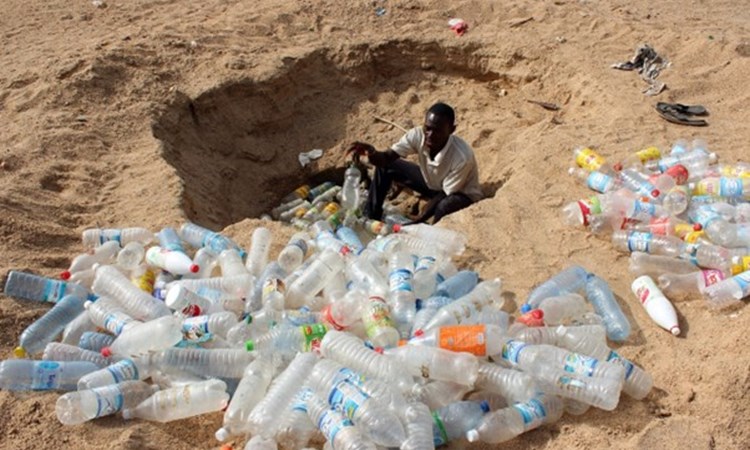
By Shammi Akhter, Alex Moores, Chris Wyver and Rana Ozturk
The plastic industry is a carbon and fossil-fuel-intensive sector. People consume around 60 million plastic bottles every hour and only 9% is recycled1. More than half plastic produced ends up in waste. Plastic is a threat to both contamination of the natural environment and climate change. Pollution by plastic happens across the whole lifecycle (extraction, consummation, and recycling processes) of plastic production. Plastic is responsible for 3.4% of global greenhouse gas emissions. Fossil fuels like oil, coal, and gas are used for the production of plastic. Plastic causes damage to phytoplankton and reduces oceans’ ability to act as carbon sinks. Partial combustion of plastic releases hydrocarbon and contributes to carbon emissions. Microplastics pollute the soil and water and pose threats to the food and water that we consume. It has negative impacts on forest and marine ecosystems, and 25% of our protein comes from the ocean. Moreover, we are inhaling microplastics from the air!
Up until 2019, trading plastics was vastly unregulated. Nowadays, many countries have started taking initiatives to reduce their carbon footprint by regulating the plastic industry. Mexico regulates and prohibits single-use plastic consumption in some of its cities and in other cities plastic consumption is totally banned (zero plastic consumption)2. With the help of UNEP, Indonesia now has a national policy concerning the import of raw materials for local industries. Their policy states that the exporter company must be registered in the local country and all the import material (100% raw material) should be from recycling. They hope to reduce their CO2 reduction to up to 15.5 million tons by enforcing this law. The UK also working on eliminating all avoidable plastic waste3. Developing countries face more environmental challenges to dispose of their plastics4. However, the World Bank is helping developing nations (e.g., Bangladesh) to tackle the plastic crisis.
Regulating the plastic industry and stopping illegal plastic waste trade is vital for improved health, food systems, ecosystems, and climate. However, with the endemic and unregulated use of plastic happening everywhere around the world – what can we do about it?
Here are some actions that might help:
- To tackle the plastic crisis we need international cooperation, environmentally friendly policies and regulations, and their local enforcement by governments.
- A sustainable manufacturing programme is also needed.
- Local actions like prioritisation of bio-degradable plastic and moving to glass for soft drinks can be undertaken to reduce carbon emissions and pollution.
- It is also crucial to regulate the waste industry and make sure that plastic is being recycled and not burned.
- To decarbonize the plastic economy, we need stop illegal plastic trafficking. Illegal trade of plastic between importing and exporting countries has to be stopped according to international trade laws.
- Plastic supply chains need to be transparent and trackable.
- Unsorted plastic waste must be controlled.
No matter where in the world we live, we need a waste-free circular plastic economy. That means we have to make sure that materials are flowing in a closed-loop system and that nothing is being leaked into the natural environment.
We must act now to stop using single-use plastics if we wish to head towards net zero!
1Geyer, Roland & Jambeck, Jenna & Law, Kara. (2017). Production, use, and fate of all plastics ever made. Science Advances. 3. e1700782. 10.1126/sciadv.1700782.
2Griffin, M. and R. Karasik. Plastic Pollution Policy Country Profile: Mexico. NI PB 22-09. Durham, NC: Duke University.
3https://www.gov.uk/government/news/next-steps-to-tackle-plastic-waste
4Shelby Browning, Betsy Beymer-Farris, Jeffrey R Seay (2021). Addressing the challenges associated with plastic waste disposal and management in developing countries. Current Opinion in Chemical Engineering, Volume 32, ISSN 2211-3398, https://doi.org/10.1016/j.coche.2021.100682.

